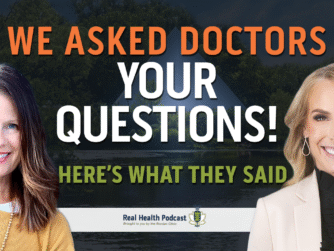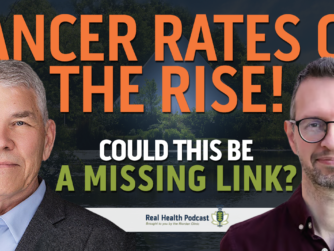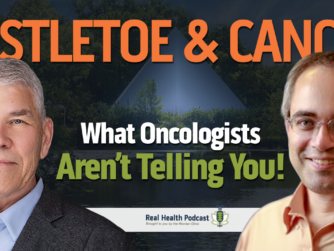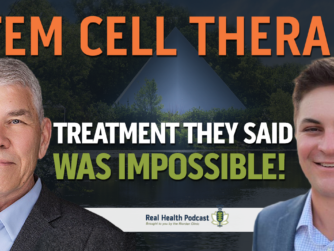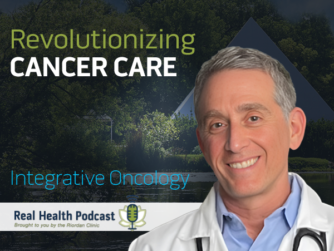In this episode of the Real Health Podcast, Chief Medical Officer Dr. Ron Hunninghake, MD, talks to neuroscientist, Dr. Hayley Nelson all about the intersection between stress and health.
Thanks to This Episode’s Sponsor
Riordan Clinic Nutrient Store: https://store.riordanclinic.org/
Links
Learn more about the hosts: Dr. Hayley Nelson: https://www.bewellwithdrhayley.com/
Dr. Ron Hunninghake: https://riordanclinic.org/staff/ron-hunninghake-md/
Learn more about Riordan Clinic: https://riordanclinic.org/ Interested in becoming a Patient: https://riordanclinic.org/request-an-appointment/
Read the Transcript
Disclaimer: The information contained on the Real Health Podcast and the resources mentioned are for educational purposes only. They’re not intended as and shall not be understood or construed as medical or health advice. The information contained on this podcast is not a substitute for medical or health advice from a professional who is aware of the facts and circumstances of your individual situation. Information provided by hosts and guests on the Real Health Podcast or the use of any products or services mentioned does not create a practitioner-patient relationship between you and any persons affiliated with this podcast.
00:00:02:21 – 00:00:17:01
Narrator
This is the Real Health podcast brought to you by Riordan Clinic. Our mission is to bring you the latest information and top experts in functional and integrative medicine to help you make informed decisions on your path to real health.
00:00:17:03 – 00:00:43:09
Dr. Ron Hunninghake
Well, doctor Dr. Hayley Nelson, We welcome you to the Real Health podcast. I’m doctor Ron Hunninghake I’ve been fascinated with the whole concept of how stress affects health in general, but you’re kind of an expert in women’s health, and especially how stress affects women’s health. So tell me a little bit about your background and how you got into this and how this impacts women.
00:00:43:11 – 00:01:09:23
Dr. Hayley Nelson
Absolutely. Well, thank you again for having me on. I love talking about all things brain related. So as a neuroscientist, I do have my PhD in psychological and brain sciences, and I’m an educator, so I am a full time professor at a college, in the Philadelphia area. And also I’ve created an academy to really focus on educating people about brain health and mind health as well.
00:01:10:00 – 00:01:32:04
Dr. Hayley Nelson
And so I have to say that the number one thing that people ask me about is stress. And because, I mean, who doesn’t have stress, right now in their lives? And how what is it doing to their brains and their bodies, and how can they help mitigate some of those negative consequences? And especially when we’re talking about women’s health in general, I think it’s so important.
00:01:32:04 – 00:02:04:09
Dr. Hayley Nelson
I mean, it’s important for men’s health as well, clearly. But you know, having more. Most of my students are asking me about the women’s health because I’m a woman, I’m a mom, I’m a busy working person with tons of stress in her life as well. And so being able to come at it from both a practical standpoint and approachable standpoint, I think is, you know, one of the most fun aspects of what I do to be able to really work alongside my students and help them and also help myself at the same time.
00:02:04:11 – 00:02:34:01
Dr. Ron Hunninghake
Yeah, I’m a family physician by training, and my early interest in working in in this field is on the stress component of chronic illness. And, I mostly see women, you know, women are the ones that come to doctors and they drag their husbands in. But, I’ve been fascinated with the fact that in our culture, women absorb a lot of the stress of a family, a lot of the stress of what’s going on in the world.
00:02:34:03 – 00:02:44:14
Dr. Ron Hunninghake
And what is it about women that makes women either? Do you believe they’re more adaptable to stress than men, or is there?
00:02:44:16 – 00:03:11:11
Dr. Hayley Nelson
I don’t want to say more. I think that women are better at multitasking, but it does not mean that we should be doing it right. So, I think that just the way that our brains are organized and some of the, the neural connections that differentiate a male brain, a typical male brain versus a typical female brain allows us to be able to handle more of these everyday tasks.
00:03:11:11 – 00:03:39:16
Dr. Hayley Nelson
And, you know, as a mom, I’m scheduling the doctor’s appointments for my kids, and I’m, you know, grading assignments, and I’m creating a business and I’m doing this and doing that, whereas my husband gets to just focus on one thing at a time. Right? Because that’s where his brain thrives, to be able to do those things. So I think that our brains are set up differently to allow us to do more of those types of organizational and multitasking, but that doesn’t mean that it doesn’t come with a price.
00:03:39:18 – 00:03:59:09
Dr. Hayley Nelson
And one of the biggest price, you know, or one of the biggest factors of that. And, the cost of it really is this added stress component that we’re trying to take on too much all at once. And that can absolutely wreak havoc on our stress system, as well as our mental health in general.
00:03:59:11 – 00:04:23:16
Dr. Ron Hunninghake
Well, I know that women have a bigger corpus callosum than men, and they are able to look at things from both sides, from both hemispheres of the brain. And have a more holistic understanding. And I wonder if sometimes men just get, you know, being more dominant in one side, get more focused, and they’re just not aware of the whole picture of how stress is affecting their day to day life.
00:04:23:16 – 00:04:33:00
Dr. Ron Hunninghake
And maybe women are more aware of that and more sensitive and maybe more susceptible to long term stress for that very reason.
00:04:33:02 – 00:05:01:06
Dr. Hayley Nelson
And in addition, women have less circulating serotonin, right? During our reproductive years, there’s tons of studies that, premenopausal women, have lower levels of serotonin usage. So lower serotonin turnover compared to men as well as post-menopausal women. And so during these reproductive years, we don’t have a lot of those chemicals to be able to help us cope and deal with stress.
00:05:01:08 – 00:05:25:03
Dr. Hayley Nelson
As we will when we get older or compared to our male cohort cohorts. So it’s a double edged sword, right? What makes women amazing is also something that can kind of prevent us from being able to manage some of those added stressors that we have in our life as well. But that doesn’t mean that just because we have lower circulating serotonin, that we can’t handle it and take it all on.
00:05:25:05 – 00:05:39:19
Dr. Hayley Nelson
But I think a key thing is being mindful of how are these stressors affecting both my physical health as well as my mental health, and then being able to take a holistic approach to be able to mitigate some of those negative consequences, which I love teaching about.
00:05:39:21 – 00:05:45:16
Dr. Ron Hunninghake
Here’s a great question for you. Do women have more oxytocin than men?
00:05:45:18 – 00:06:12:01
Dr. Hayley Nelson
So. We release it differently. So we have chosen release when we’re lactating, for example, where men aren’t going to be able to get that right. But men absolutely do have oxytocin receptors. And a lot of it has to do with bonding. Right. And so a lot of times people think of oxytocin as the love hormone. And that’s where, you know, women can get more attached to their babies or to their partner.
00:06:12:03 – 00:06:36:16
Dr. Hayley Nelson
And men are absolutely capable of releasing oxytocin. But there’s certain behaviors and things that women tend to do more of that allows for that release. And then being able to, you know, mentally being able to focus and create that connection in a social environment, it does seem to be released more often in women to create those bonds.
00:06:36:18 – 00:06:50:11
Dr. Hayley Nelson
I’m not sure if there are or studies suggesting that men have less. Overall, I think it’s just more about the timing of when it is released and how it’s utilized, which is most important.
00:06:50:13 – 00:07:22:09
Dr. Ron Hunninghake
Well, and the raising of a family is a multitasking job. And so that has been the traditional role of women. That, of course, is expanding. And women are actually, taking more roles these days in so-called male dominated professions, which in my opinion is a good thing. But why is that is a good thing? What’s happening that women can bring to to businesses and to, organizations that men can’t bring?
00:07:22:10 – 00:07:40:12
Dr. Ron Hunninghake
I’m not, I’m not it’s not a it’s not one versus the other. But I think there is something about the female perspective that is needed in our society, which has tended to be a male dominated society. So but what is that that women bring that is so important?
00:07:40:14 – 00:08:23:19
Dr. Hayley Nelson
Well, I mean, you’re speaking to the choir here. I mean, I’ve always been advocating for, you know, women empowerment, female empowerment, and also especially in tech fields. And and you typically underrepresented it underrepresented communities. I mean, as a neuroscientist myself, I found a lot of challenges being, self-identifying as a woman in this male dominated industry and doing this research and what I was studying, and it was it was challenging and so I think that finding that empowerment is so important to be able to foster this growth, and I think it’s also the converse of it is true that men are also finding themselves in more of these caretaking roles.
00:08:23:19 – 00:08:46:14
Dr. Hayley Nelson
I have many friends whose fathers are the stay at home, stay at home mom, and the women are going out and in tech fields and industries and making the money and I think that what it does is having this opportunity to both have men do more of the caretaking at home shows. The children and the community different side and different perspectives of that area of our life.
00:08:46:14 – 00:09:15:17
Dr. Hayley Nelson
But then when we’re talking about business and in the forefront in society, you know, being the breadwinner, so to speak, having a female perspective, come on, we just see things differently. And it doesn’t necessarily mean that it’s better. It’s just a different way of tackling problems. And we can look at from a research standpoint and even look at how young girls study math and learn math equations is different than how young boys tackle the exact same problem.
00:09:15:17 – 00:09:45:01
Dr. Hayley Nelson
And a lot of that just has to do with the neural connections in their brain. And then being able to say, okay, well, I’m just going to look at this problem from a different perspective. We’re going to end up with the same answer, but I’m just coming about it from a different way and being able to honor that from starting from a very young age, so that young girls feel empowered to be able to speak up in different situations in boardrooms and say, you know, I have a different perspective on this, and we’re going to come to the same conclusion, which will be best for the company.
00:09:45:06 – 00:10:12:03
Dr. Hayley Nelson
But let’s look at it from this point of view. And it’s always important to have diversity, whether we’re talking about a gender diversity versus ethnic diversity, different cultures can have different life experiences that they can always bring to the table. So I’m always an advocate for increasing the amount of diversity. Anytime a decision is made to be able to get different inputs and information coming in, to be able to have a more holistic viewpoint of whatever problem is that we’re trying to solve.
00:10:12:06 – 00:10:12:22
Dr. Hayley Nelson
Yeah.
00:10:12:24 – 00:10:34:00
Dr. Ron Hunninghake
The word that comes to my mind in terms of what women bring to business is this concept of nurturance. And I grew up my mom was this the eighth of nine girls. So I had a lot of aunts and a lot of cousins. But there was a greater sense. I mean, I grew up with a really strong sense of nurturance.
00:10:34:02 – 00:10:53:16
Dr. Ron Hunninghake
And and here at the Riordan Clinic, you know, we do talk about caring for the whole person and nurturing your body and taking better care of yourself. And I think that is a really dominant strength of women in terms of any organization. Because, you know, we all need nurturing. You know, a lot of men would like to think they don’t need it.
00:10:53:16 – 00:11:11:06
Dr. Ron Hunninghake
But the fact is, we may need it more than women just don’t want to admit it sometimes. But I think, in terms of a business organization, especially in these days where there’s so much stress back to the whole idea of stress, we need to counterbalance that stress with strong nurturance.
00:11:11:08 – 00:11:47:11
Dr. Hayley Nelson
For ourselves as well as for others. Right. And it’s interesting talking about the nurturing aspect of women that the female brain is actually trying to be nurturing compared to a male brain, even just the sound of a baby crying triggers a different emotional response in a female organized brain. Compared to a typical male organized brain. And even if you’ve never had children in your life, just the actual frequency of a typical baby cry is detected differently in the ears of women, in the eardrums, and even into the ear canal.
00:11:47:11 – 00:12:14:11
Dr. Hayley Nelson
And you know all of that. The actual and the cochlea is differently absorbed and recognized, and that triggers a different emotional response in a female brain versus a male brain. And so we are hard wired to be nurturers. Now, of course, some people are more nurturing than others, right? There’s certainly women out there that are not great nurturers because we’re individuals and there’s going to be a broad spectrum.
00:12:14:11 – 00:12:37:14
Dr. Hayley Nelson
But on average, you do see some more of those types of traits. And also there’s cultural influences as well that you tend to kind of mimic your parents. And the primary caregiver was a very nurturing person. That’s how you learn. And so we have the social learning, paradigm as well to bring and bring to the table. And, and on average, we do see more women have that kind of a role.
00:12:37:16 – 00:13:05:24
Dr. Hayley Nelson
And it’s so important to not only worry about other people and be a nurturer for your children and for your husband and for your employees and for your coworker hours. But I think the biggest thing that women struggle with, at least from the women that I encounter, my friends, my clients, my students, is that they’re so busy taking care of other people that they’re not taking care of themselves, that they’re not nurturing themselves the way that they give their all to all of these other people in their life.
00:13:05:24 – 00:13:23:04
Dr. Hayley Nelson
And I am 100% guilty of this myself. I actually had a doctor’s appointment earlier this week, and I said, I know exactly what I’m supposed to do. I tell everybody else in my life to do these things. I know what I need to do. Why am I not doing it right? So how can we get over this hurdle?
00:13:23:04 – 00:13:39:09
Dr. Hayley Nelson
And it’s we’re great nurturers, but sometimes we forget to take care of ourselves and we can’t pour from an empty cup, right, as the saying goes. So I think it’s a really good reminder to, yes, embrace our nurturing abilities, but don’t forget to nurture and care for ourselves as well.
00:13:39:11 – 00:14:09:24
Dr. Ron Hunninghake
There’s a saying that sometimes our strength, our greatest strength, is our greatest weakness. And I think what women do so well is multitask. But in the process of multitask, asking for others, they don’t get enough care for themselves. And, and that that can be the downfall. But I know that organizations are based upon models. I mean, to have a strong organization, you have to have people that can do many different jobs.
00:14:10:01 – 00:14:30:16
Dr. Ron Hunninghake
But they may not be able to balance all those or juggle all those in a way that keeps them from, getting all stressed out. So this is the this is the challenge here is how do we multitask and gnaw and nurture at the same time. And maybe that’s that’s what women can bring to an organization.
00:14:30:18 – 00:14:55:21
Dr. Hayley Nelson
Absolutely. And I think it’s also on the organization to be able to recognize that this might be, as you said, you know, your greatest, aspect can also be your greatest downside as well. So understanding that there are going to be people who are going to be quote unquote, stressed out. So provide opportunities and resources for their employees to say, okay, let’s have a, a breathing exercise today.
00:14:55:21 – 00:15:24:19
Dr. Hayley Nelson
Let’s go for a company walk, let’s get some social activities outside of the workplace to really build this sense of community, to allow for some stress relief. And, you know, being able to look at their employees from a holistic perspective and say, yes, we want people from diverse backgrounds with diverse abilities, but with that comes the added responsibility to be able to make sure that everybody’s able to work to their best of their ability and not to a detriment of their health.
00:15:24:21 – 00:15:53:09
Dr. Hayley Nelson
And I think far too often people forget about the importance of mental health because it the mind brain, body connection is so important that with the great, with the proper mindset, you can help heal physical ailments and vice versa. If you’re not taking care of yourself physically, that’s also going to hurt your mental health. And so taking care of both is part of this holistic picture to create happy employees and healthy people.
00:15:53:11 – 00:16:24:24
Dr. Ron Hunninghake
Where does hormones play into all this? Because I think there’s a, concern that women are, quote, hormonal. And obviously there’s the fluctuations of the, the menstrual cycle and whatnot. So of course, I that’s where I was coming in with, you know, there’s also a stronger emotional component to how a woman functions. But do hormones work in favor or do they work against the, the, the, the, the new role of women in, in modern business?
00:16:25:01 – 00:16:46:14
Dr. Hayley Nelson
I mean, I think it’s a double edged sword, right? So we have these hormonal, natural hormonal fluctuations that make us uniquely powerful and and awesome, right? For lack of a better word, as individuals and to be able to provide all of those different balances in a workplace. But they do come with their own set of challenges, right? So they do affect your mood.
00:16:46:14 – 00:17:16:00
Dr. Hayley Nelson
They do affect your mental health. And so I think that a key thing is recognizing. So if you’re a naturally cycling woman, if you can track when okay. So I’m going to be super productive during this time in my cycle. And then if you are able to create a schedule so that that’s when you’re going to be doing certain tasks that require you to be extra focused, or you know that you’ll be able to stay up late, whereas there’s going to be other times in your cycle where you just don’t want to talk to anybody.
00:17:16:02 – 00:17:36:20
Dr. Hayley Nelson
And if you can recognize that those are the times that will be really good for doing some more of your scheduling or more of your email responding, things like that. So understanding that we do have this natural cycle and we have the different needs and so understanding that, yes, at the end of the day, at the end of the month, I’m going to be able to accomplish all of these things.
00:17:36:20 – 00:18:09:00
Dr. Hayley Nelson
I might just need to organize it in a different way that flows better with my own unique our superpowers. Right, that allow me to be able to be super focused, but then also have times where I’m more introspective that I can solve problems from a different light, and being able to embrace that throughout the month. We’re going to have different abilities at different times and then be able to organize your schedule and your tasks in such a way to really optimize when you need those different things.
00:18:09:00 – 00:18:09:22
Dr. Hayley Nelson
Don.
00:18:09:24 – 00:18:38:07
Dr. Ron Hunninghake
Yeah. Here at the Riordan Clinic, we do a lot of hormone replacement therapy, and I was just curious about your thoughts on the importance of that becoming available to women as they enter menopause and the stages of menopause, in terms of helping them to extend their powers as a woman further into the aging process because of the power of hormones to kind of help balance things out as as a woman ages.
00:18:38:07 – 00:18:41:02
Dr. Ron Hunninghake
Is that play into your thoughts much?
00:18:41:04 – 00:19:00:02
Dr. Hayley Nelson
Absolutely. I mean, from a personal perspective, I’m perimenopausal, right? I mean, I’m not yet menopausal, but I’m, you know, I’m 42. And so it’s one of those things I’m starting to notice hormone effects differently. And these are things that I’ve been teaching about for years. But now I’m actually experiencing them for the first time as I’m getting older.
00:19:00:02 – 00:19:18:21
Dr. Hayley Nelson
Right? I, I’m not old yet. As I tell my kids, my kids think I’m like 90 years old. In their mind, I’m like, I’m not that old yet. I’m still I still got some some mojo left. But I do notice that the hormones are definitely from a personal standpoint, they’re affecting me more now than they did maybe ten years ago.
00:19:18:21 – 00:19:48:20
Dr. Hayley Nelson
And so I think the key thing is to realize that every individual is going to have their own unique experience, and some people may be able to just breeze through menopause, but they just wake up one day and they’re just like, oh, I guess I’m done, right? And they didn’t have the hot sweats and they didn’t have the night sweats, and they didn’t have the crazy dreams and the just everything else that can come with it, the cramping and the irritability, the weight gain, the bloating, all of those negative things that can happen.
00:19:48:22 – 00:20:27:04
Dr. Hayley Nelson
But then other people might need that added support and say, you know what? I’m going through this transition. And if there’s something out there that can help me transition in a more and in a way that’s not going to affect my mental health and physical health as much, then why not opt to do it? And I think that it really needs to be a individual discussion with each person’s, you know, practitioner, whether it’s a medical doctor or a natural traffic physician, whoever it is that they’re working with, to make sure that they’re doing it in a safe way and that it’s helping them instead of I you know, sometimes I think women are just told,
00:20:27:04 – 00:20:51:09
Dr. Hayley Nelson
oh, we’ll just go on hormone therapy. And it’s just like, well, you might not need it might not be right. But then, of course, there’s individuals who it can really, really help, especially when you’re dealing with some of these mental health challenges like depression and anxiety that typically come along with these hormonal fluctuations because they can be extremely debilitating not only for your professional career life, but also for your personal and family life as well.
00:20:51:09 – 00:21:08:17
Dr. Hayley Nelson
And if your whole world is crumbling around you. And here’s a hormone therapy that’s going to just make you feel better and allow you to be more productive wearing all of the hats that you wear, then I think it’s absolutely a fantastic thing that physicians like yourself are able to offer to your patients and clients.
00:21:08:17 – 00:21:33:24
Dr. Ron Hunninghake
Well, it was amazing to me to learn more and more about progesterone, even pre premenopausal, you know, the PMS thing. Premenstrual syndrome is oftentimes a progesterone deficiency. The early stages of preparing menopause or pre menopause. Oftentimes women are not obviously eating and they’re not making the progesterone that they were normally used to having in the second half of their cycle.
00:21:34:01 – 00:22:08:04
Dr. Ron Hunninghake
So this kind of knowledge for women can be very empowering and help them kind of balance out their overall emotional status. It’s just the fact that we are, at the Riordan Clinic. We’re wanting people to get to know themselves biochemically, hormonally, spiritually, the whole person, you know, and, and and the more you know about these different facets, the more you can use them to your own advantage, your own self-growth, as well as to whatever business you’re in, or if your business is your family, that might be your business.
00:22:08:06 – 00:22:27:08
Dr. Ron Hunninghake
You still need to know about these things in order to be effective as a woman, as a mother, as a as a business woman, these kinds of things. And so I think all that we can do in the field of nutrition and health and wellness and hormonal balancing can be spectacularly important for women in the modern era.
00:22:27:10 – 00:22:52:20
Dr. Hayley Nelson
Absolutely. And another thing that I really want to be able to use this platform to speak on is the importance of more research in women’s health. Right? That I think I mean, as a neuroscientist, for example, when I was going through my studies, everything I mean, it was just a lot easier to study males than it was to study females because, well, the males don’t cycle like the females do.
00:22:52:20 – 00:23:11:20
Dr. Hayley Nelson
I start I used an animal model. So, you know, whether it’s an extra cycle or whatever for the for the rodent model, it was just a lot easier. So all of the studies were on male brains and male behaviors. And it was always kind of just in my back of my mind, it’s like, oh, well, I don’t even want to touch on the female behavior.
00:23:11:22 – 00:23:35:15
Dr. Hayley Nelson
I’m just going, I’m going to you know, work on this. And because this is where the body of evidence is. And so there is this, stigma, not necessarily a stigma, but there’s this unfounded belief that it’s it’s harder to study female brains and study women. Right? I use the term female and women differently because women implies a gender which has more cultural influences as well.
00:23:35:17 – 00:23:59:14
Dr. Hayley Nelson
And but being able just looking at the brain itself and the neural chemistry and the neural networks and how it’s different between a male brain and a female brain, is really under studied in my perspective. And so when we’re talking about these hormone therapies, there’s a lot less research on women’s health than there are. I’m looking at different hormone treatments for men or different types of pharmaceuticals for men.
00:23:59:14 – 00:24:24:08
Dr. Hayley Nelson
It’s a lot easier to study them because they don’t have those hormonal fluctuations. So how some of these from a lot of from illogical pills or medicines or cancer treatments or whatever it is that you’re taking, will absolutely affect women differently than it will affect men, because this estrogen and progesterone cycling is going to influence how we metabolize some of these drugs and how we utilize it in our bodies and our brains.
00:24:24:08 – 00:24:43:06
Dr. Hayley Nelson
And so a big one would be for more research funding, more people interested in studying it, so that we can expand our knowledge so that we can better inform our patients and clients and students so that they can make more educated decisions on what will make the most sense for their own personal health journey.
00:24:43:06 – 00:25:16:20
Dr. Ron Hunninghake
Yeah, well, we’re we’re coming to the end of our time. But I wanted to let you know that one of the reasons that I think, we value women, not I’m I’m sure everyone does, but we especially value women because the Riordan Clinic was really the genius of Mrs. Olive Garvey, who was Doctor Riordan’s friend. And she was taking her grandchildren into doctors to get their nutrient levels checked way back when, before nutrition became a big thing and the doctors didn’t know how to do it.
00:25:16:20 – 00:25:43:12
Dr. Ron Hunninghake
It wasn’t taught in the medical school. And so she teamed up with Doctor Riordan to start a nutrition laboratory so that we could start to understand how nutrient factors play into health and wellness. And and so a lot of the genius of the Riordan Clinic was due to a woman’s insight and how important nutrition and self-care was. And so I’m very grateful for you and for all women.
00:25:43:14 – 00:26:01:05
Dr. Ron Hunninghake
I honestly, I, I of course, I’m I grew up in a matriarchal family, but I think it’s very healthy. The directions that we’re taking as women become more equally involved in all aspects of our life. And so anything that we can do to help women be healthier, I’m for it.
00:26:01:07 – 00:26:35:06
Dr. Hayley Nelson
Yes, yes. I love having these conversations as well, you know, and just focusing on the neuroscience behind different decisions that we make are motivational states, neurodevelopment. How we handle stress and trauma or addiction differently is so important. So all aspects of our life can be looked at from this behavioral endocrinology approach and integrated with neuroscience and integrated with medicine, and how we can look at individuals as unique individuals, but also from a holistic perspective.
00:26:35:08 – 00:26:46:07
Dr. Hayley Nelson
And so, you know, I definitely welcome any, you know, questions. If anybody has anything, they can always feel free to reach out to me and contact me. And I would love to continue this conversation again.
00:26:46:07 – 00:27:07:10
Dr. Ron Hunninghake
Well, I think we want to invite you back again some time. Doctor Hayley Nelson, to talk to us a little bit more about how how the uniqueness of women play into the cancer epidemic that’s currently going on in the world. And so until that next time, thank you very much for being on our show today. And good luck to you and keep up the good work.
00:27:07:12 – 00:27:10:18
Dr. Hayley Nelson
Thank you. You as well. Thanks. Great day.
00:27:10:20 – 00:27:31:02
Narrator
Thank you for listening to The Real Health podcast. If you enjoyed this episode, be sure to subscribe and leave us a review. You can also find all of the episodes in show notes over at Real Health podcast.org. Also, be sure to visit Riordan Clinic dot org, where you will find hundreds of videos and articles to help you create your own version of real health.


